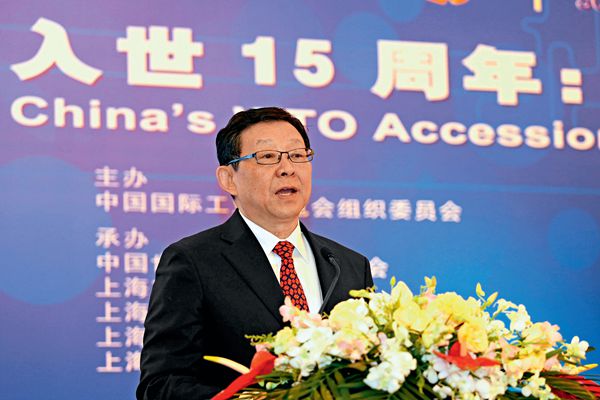Seeking Common Development in Asia-Pacific
China Today, January 23, 2017 Adjust font size:
DECEMBER 11, 2016 marked the 15th anniversary of China’s accession to the World Trade Organization (WTO). It was also the expiration date, according to Article 15 of the Protocol on the Accession of the People’s Republic of China, of the surrogate or analogue country approach WTO member countries use to calculate anti-dumping measures against Chinese exports. All WTO members committed to abide by this expiration 15 years ago.

At the annual meeting on November 9, 2016 of the Shanghai WTO Affairs Consultation Center Advisory Board, Chen Deming, President of China’s Association for Relations Across the Taiwan Straits, spoke of China’s profound influence on the global economy in the 15 years since joining the WTO.
However, on October 19, 2016, the European Commission presented its long awaited proposal regarding a new methodology for anti-dumping investigations. Linked to elimination of the existing list of non-market economy countries, modernization of trade remedy legislation, and new anti-dumping and anti-subsidy investigation models, the new approach makes market distortion the precondition for anti-dumping comparisons and the premise on which to adopt the informant’s cost and price. This is determined by the extent of government policy influence, state-owned enterprise distribution, and the level of independence of financing institutions. Countervailing measure to any alleged government subsidies may then be adopted.
“Although not explicitly, several price distortion conditions are clearly directed against China,” Vice President of the China Society for WTO Studies Xue Rongjiu said. On November 9, the European Commission submitted to the European Parliament and Council of the European Union the formal proposal to amend its anti-dumping legal system.
“Since joining the WTO China has always abided by its rules, to the benefit of both the country and the world,” Xue said. It is his hope that the WTO member states that followed the analogue country method towards China will terminate such approach according to the schedule specified in Article 15. Trade between them and China may otherwise be affected.
Obeying the Rules
Fifteen years after rejoining GATT and engaging in WTO negotiations, on December 11, 2000, China became the 143rd member of the WTO. During negotiations, China accepted around 30 multilateral rules, and also four special rules, namely, the minimum transition period review, the China-specific safeguard provision, the special textile safeguard, and the Non-market economy provision in anti-dumping, or Article 15 as mentioned above.
With respect to the minimum transition period review, China was reviewed not only by every member but also subject to special annual investigations on the country’s trade policy annually, which has been expired in 2011.
As to the China-specific safeguard provisions, these stipulated that should certain Chinese exports have an impact on the industry of other members, these members could adopt measures to limit China’s exports. This provision expired in 2012.
The special textile safeguard provisions refer to the Multi-Fiber Arrangement (MFA) whereby developed countries restricted developing countries in the 1970s. It was phased out in 2005. However, China, as a large textile trading country, was forced to abide by the MFA until 2008.
According to Xue, when the fourth specific clause was about to fall due, the European Commission proposed market distortion as a substitute for the non-market economy approach with the specific intent of extending that of the surrogate country. Terminating the surrogate price clause according to the specified date is the imperative international obligation of every WTO members.